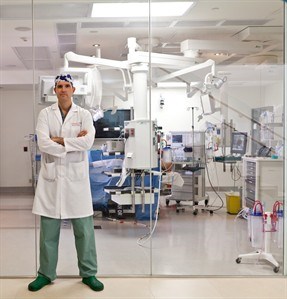
Dr. Teodor Grantcharov, a laparoscopic surgeon at St. Michael's Hospital in Toronto, is shown in a handout photo. THE CANADIAN PRESS/HO
January 27, 2015 - 11:44 AM
TORONTO - It's said that practice makes perfect, whether serving an ace in tennis, nailing a three-pointer in basketball or being able to rocket a puck past a particularly agile goalie. But practice doesn't have to be physical: mental training using visualization can also up one's game — and not only in the domain of sports.
Doctors also can benefit from the principles of cognitive rehearsal, says Dr. Teodor Grantcharov, a laparoscopic surgeon at St. Michael's Hospital in Toronto who has used the technique to optimize his operating room performance since his days as a resident.
"I always wake up in the morning and I think for five, 10 minutes about the cases I have today and kind of imagine what kind of steps am I going to do. What am I going to do if this goes wrong? And it kind of prepares you mentally for the day. And suddenly I feel less stressed."
"I still do it every day when I'm in the operating room, and my own experience combined with evidence from other high-performance industries like professional sports gave us the idea that this is something we'd like to study in a systematic way."
So Grantcharov and a team of researchers, including lead author Marisa Louridas, set up a study to determine if mental practice could improve training in laparoscopy, or keyhole surgery, among third- and fourth-year residents using a simulated "black box" operation.
Twenty surgical residents were randomized to receive either conventional training or training that included mental practice before performing a "JJ" —short for jejunojejunostomy — on the small intestine of a pig. Because they are anatomically similar, a pig's intestine is a good surrogate for the human digestive organ.
The JJ is one part of a type of gastric bypass surgery performed on severely overweight people to help them shed pounds when dieting hasn't worked. It is also a technically challenging operation when performed with minimally invasive laparoscopy using a scope-guided instrument that a surgeon manipulates while watching images on a screen.
"Obviously, very little movement with your hands translates into a massive movement on the other side of this long instrument," says Grantcharov, explaining that because surgeons work in a three-dimensional field but see it only in two dimensions, sense of "feel" is critical.
The JJ requires the most advanced technique in laparoscopic surgery — "intracorporeal suturing" — the hardest skill to teach and the most difficult to master, he says.
"With our previous experience using the surgical black box, we've noticed that 86 per cent of the errors during surgical practice happen during two steps of this procedure — the suturing or grafting the bowel," says Grantcharov, noting that a slip-up could mean perforating or injuring the intestine. "If you recognize it, you can repair it; if you don't recognize it, this will result in a very morbid complication — a leak and septic shock."
To determine if visualization practice could change that statistic, the researchers gave half the residents in their study a "script" so they could mentally prepare for a week prior to the training operation. The script outlined each step of the procedure, based on input from expert surgeons who had described "how they do it and how they see and feel," says Louridas.
This group also received imagery training from Dr. Dana Sinclair, a Toronto-based performance psychologist who works with a number of professional sports teams, among them the Toronto Raptors, Los Angeles Dodgers, Anaheim Ducks and Calgary Flames.
"People visualize all the time," explains Sinclair, whose clients also include musicians, actors and lawyers preparing witnesses for court. "Basically, it's just creating in your head, it's imagining, it's daydreaming.
"You use visualization in a more formal sense if you're trying to improve something, if you're trying to create a different way to do something. It's practising without actually performing."
For the surgical residents, the script allowed them to repeatedly go through each step of the operation in their heads, says Sinclair. "That way you learn which parts of the procedure are more difficult for you or more stressful for you, and you can plan."
As it turned out, the difference between trainees who mentally practised prior to the simulated surgery and those who didn't was striking, especially since instructors threw in a surprise surgical curve ball — a mock emergency in which residents were told their "patient" had gone into potentially fatal anaphylactic shock and they had to react quickly.
"We found when comparing the two groups, the people who had the imagery training were much better at doing the technical component," says Louridas.
During the crisis scenario, spikes in blood pressure and heart rate readings showed trainees in both groups were equally stressed. But the visualization group was able to perform better, whereas those without that preparation "were kind of thrown off by that and weren't able to perform well," Louridas says.
Although the study published in January's British Journal of Surgery focused on residents, Grantcharov believes such mental practice could also help practising surgeons be more prepared should an unforeseen complication arise in a patient.
"We hope by publishing this, talking about it, more surgeons would like to have access to the materials that we created during this study," he says, adding that the team plans to introduce the technique for other types of operations and to make the information available internationally.
"We certainly feel that this is a concept that has worked very well in professional sports and music especially, and we should be aware of this opportunity and use it more in our daily practice."
Follow @SherylUbelacker on Twitter.
News from © The Canadian Press, 2015